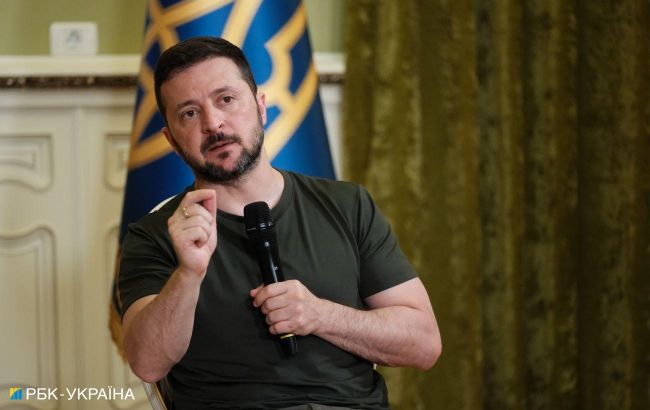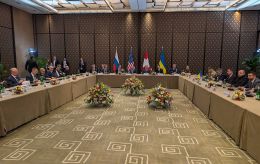War, mobilization and US elections: Key takeaways from Zelenskyy's press conference
 Photo: Volodymyr Zelenskyy, President of Ukraine (Vitalii Nosach / RBC-Ukraine)
Photo: Volodymyr Zelenskyy, President of Ukraine (Vitalii Nosach / RBC-Ukraine)
The President of Ukraine, Volodymyr Zelenskyy, has held a press conference for journalists today. During the conference, he spoke about his views on potential policy changes in the United States following the elections, and possible personnel changes in the government, assessed the mobilization process in Ukraine, and answered many other questions.
RBC-Ukraine presents the President's statements below.
US elections and Trump
Responding to a question from RBC-Ukraine about potential changes in US policy after the presidential elections, Zelenskyy expressed confidence that he is ready to cooperate with Donald Trump should he return to the White House.
"As for ending the war, the vision of the potential president or one of the candidates for this position, Donald Trump, the general things are clear to me. I think if Trump becomes president, we will work together. I am not afraid of this. We are at war, we are emotional. And when there is uncertainty, and indeed the Republican Party is different, and there are hawks whose messages are more right-wing or more radical, I guess. But I want to tell you that the majority of the Republican Party supports Ukraine and the people of Ukraine," the President noted.
Later, answering another question about whether there is a risk of reviewing NATO's decision to allocate 40 billion euros for military aid to Ukraine per year if Trump becomes the US president, he dismissed such concerns.
"I believe that we have such a decision, it is absolutely fair, and that whoever is at the head of the United States of America will not stop this assistance," the head of state answered.
Government reshuffle
Commenting on the possibility of personnel changes in the government, he stated that he is "discussing certain changes with some ministers." However, the head of state avoided answering whether to expect Prime Minister Denys Shmyhal's resignation soon.
"I don't know if this is criticism or reflection on the fact that our ministers change very often. And now they say otherwise, that we have the longest-lasting government in Ukrainian history. So what do you want? Do you want us to make changes or not?" the President rhetorically asked journalists.
Mobilization
Zelenskyy was also asked to evaluate the progress of mobilization after the corresponding law came into effect on May 16. According to him, mobilization is proceeding "according to the plan," but there is a nuance regarding the training of recruits.
"As for training grounds, there are not enough of them. Whether they can be expanded - they are already being expanded. Whether it is possible to expand the base abroad - yes, it is possible," Zelenskyy noted, adding that the expansion of training bases is one of the points of the bilateral security cooperation agreement with Poland.
Russian offensive in the Kharkiv region, Zaluzhnyi and Syrskyi
The President emphasized that the Russian troops' offensive in the northern Kharkiv region failed, "all experts acknowledge it." He recalled how before this offensive, Ukraine had been waiting for almost 8 months for the US aid package to be voted on, which was a serious challenge for Ukrainians.
In the context of the situation in the Kharkiv region, he also refused to compare former Commander-in-Chief Valerii Zaluzhnyi with the current Commander-in-Chief of the Armed Forces of Ukraine, Oleksandr Syrskyi.
"I treat everyone with appropriate respect. Each performed or is performing their task in their place. It's hard to say what would have happened if the army leadership had not changed. These questions and discussions are for post-war times...I don't think that if anyone else were in Syrskyi's shoes, there would not have been a corresponding breakthrough (in the Kharkiv region - Ed.). I believe there would have been. Because the Russians wanted this. The task was to enter and occupy Kharkiv. The big plus in this situation regarding Syrskyi is that he knows Kharkiv. And that's significant. He fought for it and reclaimed that region. And the successful operation in the Kharkiv region was precisely under his command," Zelenskyy asserts.
Intelligence words regarding offensive from the north
Commenting on the recent statement by the head of the Defense Intelligence of the Ministry of Defense, Kyrylo Budanov, regarding Russia's offensive from the north, Zelenskyy said that the intelligence chief was misunderstood. The president shared that he spoke to Budanov about his statement, and Budanov replied that "he was not quite understood correctly."
"We understand that an offensive can happen: we are at war with the Russians. An offensive can just happen. I believe that the situation is the most difficult in the east. Serious work has been done in the Kharkiv region to prevent a powerful offensive from the north. Because it was stopped there, it pulled troops from various parts that were stationed along our border," he said.
Strikes deep into Russian territory
When asked about the possible development of Ukraine's long-range weapons, besides drones, Zelenskyy intrigued: "Besides drones, yes, we are working on other systems that will allow us to be more long-range."
"Currently, everyone is thinking about how to preserve energy, and that is true. Preserving our energy partially, I'll be honest with you, depends on the fact that we have delivered powerful strikes on Russia's generating energy facilities. And now we can talk with our partners about solving energy security issues. Because this has become very important for everyone," the President noted.
He added that earlier, even strikes on Russian territory with Ukrainian-made weapons were critically perceived by the Western partners due to fears of escalation, but now this issue (regarding strikes with Ukrainian weapons) is no longer raised by anyone.
Insufficient aid from partners
The head of state emphasized that he does not see Ukraine being pushed toward negotiations with Russia.
"Of course, there are leaders who would like to push us. Of course, today they are afraid of political responsibility. If they do this openly, their societies might not support them, and some might be ousted, especially where there is strong support for Ukraine. Of course, there are coalition governments, and you agree, for example, with the leader, and he supports you, but there is someone from another party who is against Ukraine. And he blocks it. And imagine if this is, for example, the Minister of Defense. And imagine you have signed documents, everything has been voted on, the majority in this country supports it, but the Minister of Defense, for example, blocks it. And this happens a lot. This is such management, maybe it can be called micromanagement. It is daily," explained the President.
Zelenskyy acknowledged that partners are not providing sufficient aid to Ukraine to ensure its victory in the war. He is convinced that if the support was as needed, the Ukrainians would have won long ago.
"The aid is insufficient. Is it enough to hold on? Today, I believe it is. And so when they ask: 'How do you see it?' We know how we see it, but not everything depends on us. We will see the end of the war as it should be. Just. But it doesn't only depend on us. This justice, you see, depends not only on people, on our desire, but also finance, weapons, political support, unity in the EU, in NATO, in the world," noted Zelenskyy.
Patriot
According to Zelenskyy, Ukraine needs 25 Patriot anti-aircraft missile systems to completely secure its skies from enemy air threats.
"I can tell you how many Patriots we need in general. From the point of view of the structure of our air defense, to completely cover Ukraine, according to our military, we need 25 Patriots. This is for a completely closed sky over Ukraine," said the president, emphasizing that he cannot say how many such systems Ukraine will have.
F-16
In the president's estimation, Ukraine will not have enough of the Western F-16 fighter jets that it will receive from allies by the end of the year.
"The decision on F-16s is a strategic one, the number of them is not yet strategic. There is a serious number of aircraft that I have agreed on with other countries. After my agreements, there are some processes on both sides. I can't tell you how many planes there will be. They will not be enough. What are they for? They strengthen us, but will these planes be enough to fight on par with the Russian air force? I think it will not be enough," Zelenskyy noted.
Second peace summit
The President informed that in November, Ukraine should develop a plan for the second peace summit, which, in his opinion, should include representatives from Russia.
"At the end of July - early August, there will be the first meeting at the level of ministers, and security advisors to discuss the conclusions of our peace summit. The first meeting will most likely be in Qatar, focusing on energy security. A comprehensive plan on energy security will be prepared there. In August, there will be a meeting in Turkiye on free navigation and food security, where a complete plan will be developed. In September, there will be a meeting in Canada on the exchange of prisoners and children and a plan will be made there," said Zelenskyy.
According to him, "if these three points work," a plan for all ten points of the peace formula will be ready.
"Therefore, the plan will be ready for the second summit... I believe that we will be ready to bring the second summit as close as possible, and I believe that representatives of Russia should be at the second summit," Zelenskyy said, adding that other countries can come to the peace summit with their proposals, increasing the chances of involving third countries beyond Ukraine's EU and NATO allies.
Security guarantees
The head of state reminded that Ukraine has signed security agreements with 23 countries, including provisions for weapons, money, humanitarian aid, and more.
"There are 32 countries with which we have signed or will sign bilateral agreements on security guarantees. Twenty-three countries already have such agreements with Ukraine, covering everything from money to weapons, humanitarian aid to reconstruction, cybersecurity, air defense, etc. The approximate amount of these agreements is 38 billion dollars. I believe this is a powerful result," emphasized Zelenskyy.
Understaffed brigades
The head of state also clarified his recent statement about the 14 understaffed brigades. According to him, these are not new brigades but those that have not yet received the promised Western weapons. He said the process of receiving them is slow. He noted that these brigades can be considered "fresher" compared to those already fighting and have started receiving some weapons, including artillery.
Zelenskyy expressed confidence that a separate coordination center for controlling arms supplies to Ukraine could solve this problem.
"If you have 40 billion in military aid in the package, it is very important that these 40 billion (provided for different types of weapons - ed.), any weapons, from artillery to anti-tank guided missiles, etc., are delivered, and not that we later find out that 7 billion came, and the rest was spent on other things along the way," he added.
NATO Summit and Ukraine's invitation to the Alliance
In the President's opinion, Ukraine received the maximum it could at the NATO summit in Washington, but an invitation is currently out of the question.
"We did not receive at this summit (NATO - Ed.) what Ukraine cannot receive while it's at war. Without populism, without talks, Ukraine will receive an invitation to NATO and NATO membership fast, as soon as the war ends. Therefore, I believe that at this NATO summit, Ukraine received the maximum it could receive," he said.
Poland shooting down Russian missiles over Ukraine
The President believes it would be fair for Poland to help shoot down Russian missiles heading in its direction. After all, gas storage facilities with gas from European companies are located in western Ukraine. He emphasized that earlier, the issue of Poland shooting down missiles was a "red line," but "not everyone considers so," and work on this issue is ongoing.
"We are talking about the direction of Ukraine's gas storage facilities, which are often targeted. Interestingly, there are countries skeptical of our country. However, it is very important that these countries use the gas stored in our gas storage facilities. It seems to me that this skepticism should decrease because if we do not protect our gas storage facilities, these countries will be left without gas during the heating season. Our closest neighbors. We have signed bilateral security guarantees with Poland, which include technical consideration of this issue. We raised this topic and addressed it legally. I cannot guarantee 100% today. But I believe we have taken the first step. There are further nuances," Zelenskyy said.
Viktor Orbán
The Ukrainian President called the visit of Hungarian Prime Minister Viktor Orbán to Kyiv "right" but negatively reacted to the Minister's trip to Moscow.
"We are not at war with Hungarians. We need to have strong, friendly relations, at least we need to first build pragmatic relations. There are many of our people there. So, I think his visit to Ukraine was right. I did not know about his visit to Russia when he was in Kyiv. If he used Ukraine so that he could comfortably go to Russia afterward, I consider this wrong. I do not support his visit to Russia. But it is his decision," Zelenskyy said.
He recalled that the EU and NATO countries condemned Orbán for this. He also shared that at the meeting of the Ukraine-NATO Council, held last week in Washington and closed to the public, there was a very serious discussion about the Hungarian Prime Minister's trip.
"It was an adult conversation about the fact that no NATO member can have a pro-Russian policy. Therefore, honestly speaking, I believe we should try to build relations between our countries. We need to try," the President said.

